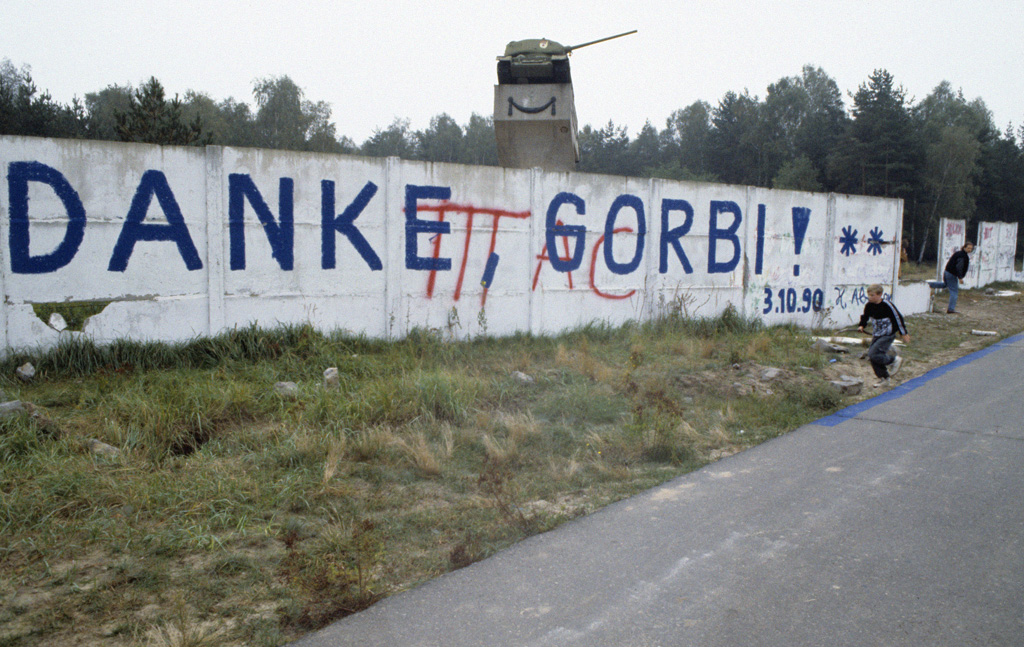1. Die Quelle Jack F. Matlock
Wer Zeitgeschichtliches studieren will, kann entweder in die Akten schauen; oder er kann, wenn er schnell ist, die noch lebenden zeitgenössischen Akteure befragen. In den USA ist man hinsichtlich der Sicherung des Gedächtnisses von Zeitzeugen in institutionalisierten Formaten weiter als in Deutschland. Da gibt es, am Middlebury Institute of International Studies, die „Ambassadorial Series“ – privat finanziert. In dieser Reihe war jüngst Jack F. Matlock dran, US-Botschafter in Moskau von 1987 bis 1991. Der hat über die Zeit seiner persönlichen Anschauung und Erfahrung zwei Bücher geschrieben, mit den Titeln
- Autopsy of an Empire, Reagan and Gorbachev
- Superpower Illusions
Matlock konnte man die im Titel dieser Notiz genannte Frage stellen – und man hat es getan. Seine Antwort ist erhellend. Sie lautet weder „Ja“ noch „Nein“. Sie lautet, analog: Für die Zeit vor Maxwell und Edison kann man nicht erwarten einen Vertragstext zu finden, in dem zum Verlegen von Kabeln zur elektromagnetischen Nachrichtenübertragung etwas geregelt ist. Sucht man später, nachdem solche Kabel möglich und sinnvoll geworden sind, eine Aussage dazu in überkommenen Verträgen, dann muss sie allgemeiner formuliert und nur durch Interpretation auf die Spezialität „Nachrichtenkabel“ beziehbar sein. Aber man lese selbst.
Der redigierte Text des Gesprächs mit Matlock ist am 24. Januar 2022 erschienen, editiert von der Monterey Initiative in Russian Studies.
2. Wie es war mit dem “Versprechen” an Gorbatschow
Die Gesprächspartnerin, Hanna Notte, stellt die Frage wie folgt
„I … want to come to really one of the elephants in the room in any discussion about the trajectory of the U.S.-Russian relationship … the issue of NATO expansion.
… there are many narratives and myths about what transpired in those crucial months in the early 1990s. Can you reflect for us on what was really promised to Gorbachev about the issue of NATO expansion at the time?“
Darauf antwortet Ex-Botschafter Matlock so.
„I think the use of the word ‘promise’ is probably not the right one. Here’s the context: first of all, when President Herbert Walker Bush met with Gorbachev in Malta, in December 1989, they came to a very important agreement.
- One was that we’re no longer enemies;
- the second was that the Soviet Union will not intervene in Eastern Europe if there’s political change; and
- the third was the United States will not take advantage of changes there.
Now nobody … was thinking of the countries of the Warsaw Pact coming into NATO or not; that simply was not on anybody’s mind. You still had the Warsaw Pact. The Berlin Wall had just come down, and it was still uncertain what was going to happen.
So, in December of 1989, Soviet policy changed very rapidly. … in February <1990>, … I think around the 10th and the 11th, Secretary of State Baker came to Moscow. … we were trying to set up a framework for dealing with the question of German unity. … we had proposed … that it be resolved in a format of ‘two plus four’. … this was first floated with Foreign Minister Shevardnadze, at a meeting in Canada in January 1990. … then this was accepted. … at that point, the Soviet position was, „Okay, if the Germans are insisting on unifying, there’s one thing for sure: a united Germany will have to leave NATO for us to approve.„“
Die sowjetische Position war also: Wir stimmen einem Verfahren zu, in dem wir den Hebel haben, um Deutschland vor die Wahl zu stellen: Vereinigung oder NATO-Mitgliedschaft. D.h. das Thema „NATO-Osterweiterung“ stand damals mit negativem Vorzeichen im Raume.
3. Nicht “Keine NATO-Osterweiterung” sondern “ die Deutsche Frage einhegen” war das Leitmotiv der Einigung
Weiter Matlock:
„So, when Baker came to Moscow in February, he was trying to convince Gorbachev that it was actually in the Soviet interest for a united Germany to remain in NATO. And he consulted with German Foreign Minister Genscher on his way to Moscow, and he proposed an idea; he prefaced it by saying, „You don’t have to give me an answer right now, but I want to tell you something you should think about.“ And the next sentence was, and I heard this so many times from him I can quote it literally, „Assuming there is no expansion of NATO jurisdiction to the east, not one inch, wouldn’t it be better?„
… then he went on to explain the advantages of having a united Germany in NATO, of keeping their military united in one, and keeping an American role in military stability.“
Das, was hier angedeutet ist, kann nur verstehen, wer die katastrophale Geschichte Kontinentaleuropas mit dem „zu spät gekommenen“ geeinigten deutschen Nationalstaat in der Mitte vor Augen hat, die sich in drei fürchterlichen Kriegen entlud. Die sog. „deutsche Frage“ konnte ja jederzeit wiederkommen – das Angebot der USA an die russisch/sowjetische Führung war: Wir halten da den Daumen drauf. Weiter Matlock:
„Gorbachev answered immediately, „I’ll think about it.“ And he said, „Obviously, any expansion of NATO jurisdiction to the east is unacceptable, but I understand what you’re saying otherwise.“ … then he added, „It had been our policy to try to exclude you from Europe. That is not our policy today, I want you to know that. We want to preserve an American presence in Europe,“ meaning military presence, „because that can contribute to stability.“ He said, „Now, and I don’t think you need 300,000 troops, but we want you in Europe, and that is part of our policy.“
… Baker then repeated this to Shevardnadze. He repeated it to his delegation, including myself. … when Baker got back to Washington, the lawyer said, „Now wait, you can’t include East Germany as part of Germany, and exclude it from NATO jurisdiction if Germany remains in NATO. That’s a legal impossibility.““
Warum Matlock das für zitierenswert hält, ist unverständlich. Es ist zwar auch heute im Hinblick auf den NATO-Beitritt eines Staates das Narrativ dominant, dass es da um eine Ja.Nein-Entscheidung gehe, und wenn ein beitrittswiliger Staat eine strittige Gebietsfrage im Gepäck habe, dann „könne“ er nicht aufgenommen werden; und das sei das Kalkül Russlands hinsichtlich der Gebietskonflikte mit Georgien und der Ukraine. Das stimmt natürlich nicht. Der Atlantik Council hat gerade das Naheliegende ausbuchstabiert, nämlich wie Georgien und die Ukraine aufgenommen werden können mit einer Vorbehaltsklausel zu den akuten Grenzkonflikten, dass die Artikel-5-Verpflichtung dafür ausgenommen sei. Es gibt Weniges „rechtlich Unmögliches“, was ein kluger und innovativ denkender Jurist nicht möglich machen könnte. Matlock weiter:
„So, this question was not raised again, and there was no guarantee in the treaty, the Two Plus Four Treaty that was finally signed in the fall, and as a matter of fact, Soviet negotiators have said since then, they never thought they had a guarantee that NATO would not expand. They did have a guarantee that there would be no foreign, that is non-German, troops in the territory of East Germany, and that nuclear weapons would never be deployed there. That is in the treaty, but nothing about NATO expansion.“
Matlock bestätigt einmal mehr, was auch in der allgemeinen Debatte immer wieder betont wird. Wer daran zweifelt, kennt die historische Lage nicht.
„… we were talking about Germany. We were not talking about the rest of Eastern Europe. … if anybody had asked me in the summer of 1990, „Does that mean that there will be no expansion into Eastern Europe?“ I would have said, „Well, of course.“ I mean, … it was already evident that probably … the East Europeans, once they went democratic, were almost certain to pull out of the Warsaw Pact. And I would have said, „There’s absolutely no need to expand NATO.“
… I will add that it was not the Bush administration that expanded NATO. I’m quite convinced that if Bush had been reelected, he would not have. And we would have used the Partnership for Peace.“
4. In welchem Sinne die USA die damalige Absprache gebrochen haben
Um auf das methodische Bild mit dem vor der Zeit von Maxwell und Edison geschlossenen Vertrag zurückzukommen, in dem man etwas zum Verlegen von Kabeln zur elektromagnetischen Nachrichtenübertragung sucht, so gilt zusammengefasst somit.
- Die USA haben die Absprache von Malta, vom Dezember 1989, gebrochen, da sie mit der NATO-Osterweiterung die Zusage „we will not take advantage of political changes in Eastern Europe“ offenkundig nicht eingehalten haben.
- Die Absprache von Moskau, vom Februar 1990, ihre Zusage, in Europa mit Truppen zu bleiben, um angesichts der geschichtlich-natürlichen Rolle Deutschlands dieses als ganzes in der NATO mit ihrer Monopolisierung der Führungskapazität zu halten und, auch dadurch, eine „role in military stability in Europe“ zu erfüllen, haben die USA ebenfalls nicht eingehalten.
Zu ergänzen ist an dieser Stelle zur Erläuterung die folgende Episode. Der damalige sowjetische Außenminister Eduard Schewardnadse hat eine Sitzung im NATO-Hauptquartier Ende des Jahres 1989, also der Militärallianz, deren Zweck die Abwehr einer Aggression seitens der Sowjetunion ist, genutzt, die Frage aufzuwerfen, ob die NATO in Wahrheit in Zukunft nicht weit mehr eines ihrer Mitglieder zu fürchten habe:
“Wo sind die politischen, rechtlichen und materiellen Garantien, dass die deutsche Einheit auf lange Sicht keine Bedrohung für die nationale Sicherheit anderer Staaten und für den Frieden in Europa werden kann? Die Geschichte selbst,“ warnte er vor einem künftigen Deutschland, frei von ausländischen Zwängen, „verlangt eine erhöhte Umsicht Europas.“ (p. 641)
Den einzigen Sinn, den ich im Insistieren Bakers auf der NATO als „Sicherheitsarchitektur“ und der Zustimmung Russlands dazu zu sehen vermag, ist motiviert aus den „ghosts of the past“, wie es Präsident Bush in Verhandlungen mit Kanzler Kohl in Camp David am 24. Februar 1990 ausgedrückt hat. Die Pointe des 20. Jahrhunderts ist, dass die Nationalstaaten Europas zweimal kriegerisch übereinander herfielen, weil sie ihre internen Machtkonkurrrenzen nicht in den Griff bekamen – „Deutsche Frage“ ist der Titel dafür. Die Funktion der NATO ist die einer Klammer, welche einen weiterhin jederzeit möglichen Rückfall in diese Konstellation verunmöglicht – siehe die Balkan-Kriege in den 1990er Jahren als Vorgang in nuce, als Modell dessen, was in Europa auch im Großen weiterhin drohend möglich ist. In diesem Sinne, und nur in diesem Sinne, sollte die NATO, so der Konsens von 1989/90 weiterhin „Sicherheitsgarant“ in Europa sein, auch nachdem ihr der manifeste äußere Feind abhanden gekommen war.
Diese Einsicht aber ist für die Nationalstaaten in Europa so schambesetzt, dass es nirgends formuliert wird. Auch nicht in der exquisiten Studie auf Veranlassung der OSZE, aus der das obige Schewardnaze-Zitat entnommen ist.
5. Warum es so geschah, warum die USA ihre Zusage brachen – Start der NATO-Expansion als Funktion der US-Innenpolitik
Botschafter Matlock berichtet auch, wie es zur NATO-Expansionitis gekommen ist; und dass da die Ukraine durchaus im zentralen Fokus war.
„… „Well, why did we?“ Well, first of all, because the East Europeans started demanding it, and we would say, „Well, they have a right to choose their alliances.“ Well also, the countries giving guarantees have the right to choose whom they guarantee or not, and whether that’s a good idea. So, this idea that somehow a country has a right to join an alliance when the alliance hasn’t necessarily invited them, is a rather, I would say, absurd idea. But the pressure did come from Eastern Europe and was supported by many, particularly, of our smaller NATO allies.“
Mit anderen Worten: Die Rechtfertigungen, mit denen heute noch die USA und ihre Alliierten Partner die „open door policy“ öffentlich und Russland gegenüber rechtfertigen, sind „absurd“ – nur ein Spiel mit Worten. Dann geht Matlock weiter, nennt den realen Grund.
„The real reason that Clinton went for it was domestic politics. I testified in Congress against NATO expansion, saying that it would be a great mistake, and that if it continued, that certainly it would have to stop before it reached countries like Ukraine and Georgia, that this would be unacceptable to any Russian government, and that furthermore, that the expansion of NATO would undermine any chance for the development of democracy in Russia.
And George Kennan had also said it was the greatest geopolitical mistake of that decade. And I think he was right.
But why, when I came out of that testimony, a couple of people who were observing said, „Jack, why are you fighting against this?“ And I said, „Because I think it’s a bad idea.“ They said, „Look, Clinton wants to get reelected. He needs Pennsylvania, Michigan, Illinois; they all have a very strong East European …“ Many of these had become Reagan Democrats on East-West issues. They’re insisting that the … [NATO] expand to include Poland and eventually Ukraine. So, Clinton needs those to get reelected.“
Es war auch diesmal so, wie es häufig ist: Innenpolitische Faktoren des Machterhalts sind bestimmend für Außenpolitik, nicht Kalküle und Funktionen im Mächtekonzert als solchen. Also Sachfremdes. So war es auch damals in den USA.
„But the fact is that … the concluding issue there was domestic politics, and really not an understanding of … how best to handle the international relations.
At that time … the Clinton administration was quite disingenuous. Clinton personally told Yeltsin that the Partnership for Peace would be a substitute for NATO expansion, and Yeltsin said, „That’s great. That’s a brilliant idea.“
At the very same time, our ambassador was instructed to tell the Poles, “This is the first step toward NATO membership.” So, we were playing, I must say, to my dismay, duplicitous diplomacy at the time, and being motivated largely by domestic issues, not what would really preserve a Europe whole and free, which was the aim of our policy in the first Bush administration. And when we said Europe whole and free, that includes Russia. It’s not just all except Russia.“
Doppelbödigkeit und Lügen sind dann Mittel der Wahl. So war es, so ist es und so wird es auch heute sein. Ein wahrhaftiges Bild der aktuellen Krise zwischen Russland und dem Westen wird nur erhalten, wer sich die innenpolitischen Bedingungen des aggressiven bzw. Spaltung nach außen projizierenden Verhaltens nicht nur in Russland anschaut, sondern auch in den USA, in den als P9 organisierten mittel- bzw. osteuropäischen NATO-Staaten und natürlich auch der Ukraine. Das Gleichgewicht der Thematisierung in unseren Qualitätsmedien ist der Maßstab für deren Seriosität. Urteile selbst, Bürger!
RIA Novosti archive, image #428452 / Boris Babanov / CC-BY-SA 3.0, CC BY-SA 3.0 , via Wikimedia Commons
















 Unser Blog lebt durch Sie!
Unser Blog lebt durch Sie!